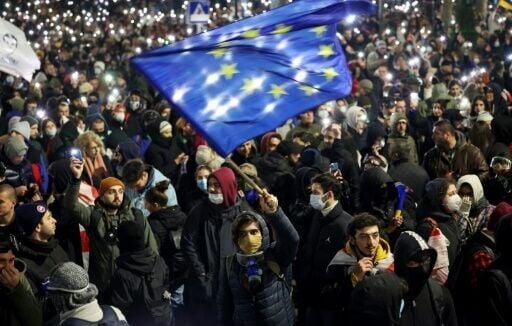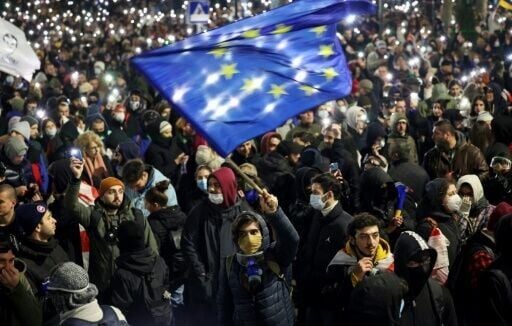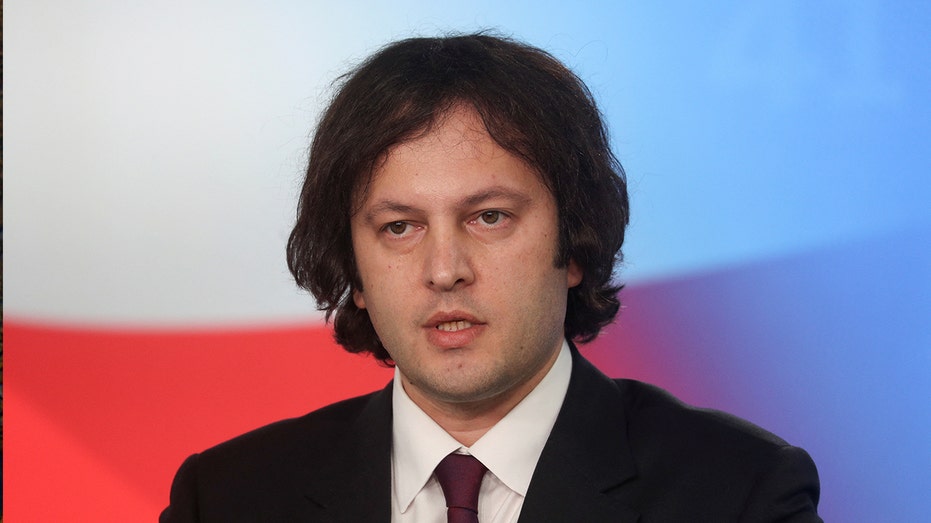
Georgia in Turmoil: PM Kobakhidze’s Tough Stance Amid Protests
Georgian Prime Minister Irakli Kobakhidze faces mounting criticism from both the United States and dissent from his own President as he publicly commended police forces for their vigorous response to recent protests. Accusing demonstrators of being swayed by foreign influences aiming to destabilize Georgia, Kobakhidze finds himself at the center of a growing political crisis.
Background: A Nation in Flux
Georgia, a former Soviet republic with a population of 3.7 million, has witnessed increasing turmoil following the ruling party, Georgian Dream, announcing a significant pause on European Union accession talks for the next four years. This announcement came on Thursday and has triggered widespread protests in the capital, Tbilisi, where mass anti-government demonstrations have erupted over three consecutive nights. The police response has been severe, employing water cannons and tear gas to disperse crowds.
Perceived Shift Towards Russia
The geopolitical implications of these developments have not gone unnoticed by the United States and the European Union. Both entities view this political unrest as indicative of a troubling shift away from Georgia’s historically pro-Western stance. Observers are increasingly concerned that the current government is forging closer ties with Russia, a nation historically viewed as a threat by many Georgians.
As protests continue, additional gatherings are expected in Tbilisi and have reportedly spread to other towns and cities across Georgia, raising concerns of a broader uprising.
Russian Military Threats and Further Escalation
Amid the chaos, Dmitry Medvedev, a senior Russian security official and former president, issued alarming statements suggesting that an attempted revolution is underway in Georgia. Through his communication platform, Telegram, Medvedev likened Georgia’s current circumstances to that of Ukraine, cautioning of dire consequences if unrest persists. Medvedev, once seen as a reformist leader, has adopted a more aggressive tone following Russia’s full-scale invasion of Ukraine, often threatening Kyiv and its Western allies.
Response from Georgian Authorities
In his defense, Prime Minister Kobakhidze dismissed U.S. criticisms regarding the “excessive force” employed by Georgian authorities during the protests. In a press conference, he asserted that the police acted according to “higher standards” than their American and European counterparts. Furthermore, he accused foreign instructors of inciting violence, though no evidence was offered to substantiate these claims. Kobakhidze sought to downplay the U.S. decision to suspend its strategic partnership with Georgia, labeling it a “temporary event” and assuring that discussions with the incoming administration of President-elect Donald Trump would continue in January.
Political Standoff with the Presidency
The political crisis has intensified with outgoing President Salome Zourabichvili announcing she would remain in office despite her term ending soon. A staunch advocate for EU integration and a vocal critic of the government, she contends that the new parliament, formed after a contested election in October, lacks the legitimacy to appoint her successor. Kobakhidze, however, insists that Zourabichvili must vacate her residence by December 29 and transfer power to the newly elected president, further escalating the conflict between the government and the president.
The ruling Georgian Dream party has put forth Mikheil Kavelashvili, a former soccer player known for his hardline, anti-Western views, as its candidate for the presidency. The election of the new president is scheduled for December 14, and the choice will be made by an electoral college composed of parliament members and local government representatives.
Georgia’s Westward Aspirations and Recent Actions
Since achieving independence after the collapse of the Soviet Union in 1991, Georgia has strived for closer ties with Western nations. The country was involved in a brief war with Russia in 2008 and has actively sought integration with NATO and the EU, recently attaining EU candidate status just last year. However, the current government has drawn criticism for its actions, including controversial legislation that requires non-governmental organizations to register as “foreign agents” if over 20% of their funding comes from outside Georgia, as well as laws that curtail LGBT rights.
Critics argue that these actions signal a strengthening authoritarianism and a drift toward pro-Russian policies, undermining the progress Georgia has made in its quest for EU integration.
International Response and Future Implications
The international community is watching closely. On Sunday, Kaja Kallas, the new EU foreign policy chief, expressed solidarity with the protesters, stating, “We stand with the Georgian people and their choice for a European future.” Kallas condemned the violence over the weekend and criticized the ruling party for diverting from the EU aspirations of Georgia. She warned of “direct consequences” for any government actions that reflect democratic backsliding.
Conclusion: A Pivotal Moment for Georgia
The confrontation between the Georgian government, protestors, and international observers marks a crucial juncture for the small nation. As the situation evolves, it remains to be seen how the political landscape will unfold, particularly concerning Georgia’s aspirations for closer ties with the West while navigating pressures from Russia. The upcoming weeks will be critical as protests continue and political tensions simmer, making it essential for all parties involved to seek resolution and dialogue.


















